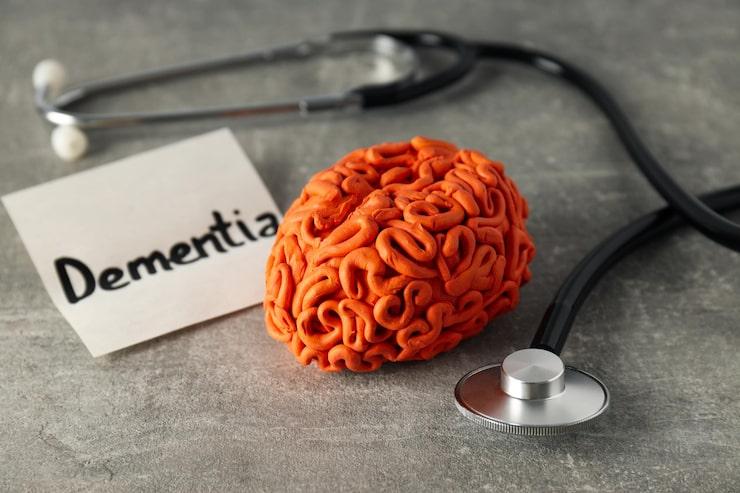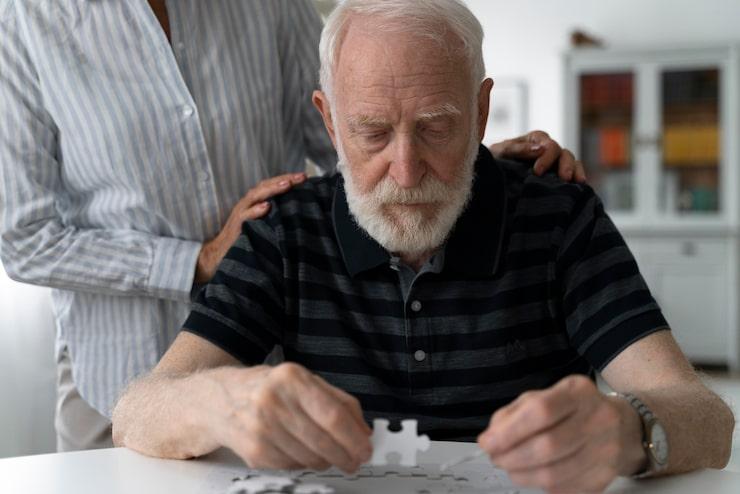
model of a brain
As we age, it's normal to experience forgetfulness and memory issues. But if these problems start to get in the way of daily life, they could be signs of dementia. Dementia is not a single illness, but rather a group of diseases that affect memory, reasoning, and social skills. They usually worsen gradually over time.
It is crucial to recognize the early signs of dementia so that it can be diagnosed and treated promptly. Many people can maintain their independence and enjoy a good quality of life for years after being diagnosed if they receive the right care and support.
This blog discusses what dementia is, how to recognize it, and when to seek professional help.
Dementia is a general term for a decline in mental abilities that is bad enough to make it hard to go about your daily life. It changes how you think, remember things, talk, and act.
Alzheimer's disease is the most common type, making up about 60–80% of all cases. Some other types are:
Dementia gets worse over time, and the first signs are often mild and easy to ignore as part of normal aging. However, an early diagnosis can make a significant difference by allowing treatment to slow the disease's progression.

elderly man displaying signs of dementia
Here are the most important signs that require medical attention.
1. Forgetting things that make it hard to live your life
It's normal to forget things from time to time, but if you keep forgetting things that affect your daily life, it could be an early sign of dementia.
People might: Forget things they've just learned.
Keep asking the same questions.
You often rely on reminders or family members to help you remember things, such as appointments or tasks.
It's normal for older people to forget where they put their keys from time to time. Forgetting what the keys are for, on the other hand, could be a sign of dementia.
2. Trouble Making Plans or Finding Solutions
Dementia can make it difficult for someone to make or follow plans, such as paying bills on time, cooking from a recipe they know, or managing their finances.
Things that used to be easy may now be hard to understand or too much to handle. People may take a lot longer to complete their daily chores or make numerous mistakes.
3. Having trouble finishing tasks you know how to do
People in the early stages may struggle with performing everyday tasks, such as using a smartphone, operating a microwave, or recalling the rules of a favorite game, at home or at work.
These problems are more than just occasional distractions; they indicate that your brain is deteriorating.
4. Not knowing what time or place it is
Another sign is forgetting dates, seasons, or places. Someone with dementia might not remember where they are or how they got there.
They might also get the time wrong and think something happened recently when it really happened years ago.
5. Issues with Words and Talking
Language problems are one of the first signs. People might have trouble finding the right word.
They may also have trouble understanding what is said or written, which can make it difficult to communicate with them.
6. Making bad choices or bad judgments
People with early dementia may not make good choices in their daily lives, like spending money poorly, dressing inappropriately for the weather, or not taking care of their hygiene.
They might also trust strangers more or fall for scams more easily.
7. Stopping work or social activities
A clear withdrawal from work, hobbies, or social events can be a clear sign of cognitive decline.
This could happen because the person is embarrassed about their problems, or just has trouble following conversations or remembering things.
8. Changes in Mood and Character
In the early stages of dementia, mood swings, irritability, anxiety, and depression are common.
Someone who used to be happy and talkative might become quiet, suspicious, or easily irritable.
Family and friends are usually the first to notice these changes in behavior.
9. Putting things in the wrong place and not being able to find them again
Everyone loses things, but someone with dementia might put things in unusual places, such as their keys in the fridge or their wallet in the washing machine, and then struggle to find them.
They might start to blame other people for stealing or moving their things over time.
10. Changes in vision and awareness of space
It can also affect how the brain processes visual information. People with early dementia may experience difficulty judging distances, reading, or recognizing faces and objects.
This can make it dangerous to drive, walk, or go up and down stairs.
If you or someone you care about is showing a lot of these signs, you should see a doctor, preferably an ophthalmologist or neurologist, to get a proper diagnosis.
Doctors may suggest:
Early medical evaluation helps find out if the symptoms are caused by dementia or by other conditions that can be treated with medical insight, like depression, vitamin deficiency, or side effects of medications.

Person with dementia doing brain enhancing activities
Dementia can't be completely reversed, but finding it early can lead to treatments that can slow the disease and make life better for the patient.
1. Drugs
Doctors may give you drugs like donepezil, rivastigmine, or memantine to help with your symptoms and make your brain work better.
2. Therapy for the mind and work
Therapy can help people keep their daily living skills, memory, and independence for as long as possible.
3. Changes to your way of life
A healthy diet that includes a lot of fruits, vegetables, and omega-3 fatty acids.
4. Help and counseling from family
Dementia doesn't just affect the person who has it; it also affects their family. Counseling, support groups, and respite care can help caregivers manage their stress and provide better care.
1. Is forgetting things always a sign of dementia?
Not always. People often forget things as they get older or when they are stressed. Dementia is a condition that causes memory loss that gets worse over time and makes it hard to live normally.
2. Is it possible to stop dementia?
It can't always be stopped, but living a healthy lifestyle—working out, eating a balanced diet, and spending time with friends—can lower the risk.
3. When does dementia usually start?
Most cases happen after age 65, but some people get dementia in their 40s or 50s.
4. If you think a loved one has dementia, what should you do?
Tell them to go to the doctor. Early assessment helps eliminate alternative causes and guarantees prompt treatment.
5. Can stress make you lose your mind?
Stress alone does not cause dementia, but long-term stress can make memory worse and lead to cognitive decline over time.
The first step to getting the right help and support is to notice the early signs of dementia. Early diagnosis provides patients and their families with the tools they need to manage symptoms and plan for their future path.
At hospitals with advanced neurology and memory care facilities, specialists work closely with patients to create individualized care plans that include medical treatment, therapy, and advice on how to live a healthy life.
Keep in mind that not every time you forget something is dementia. However, ignoring the warning signs can delay care that really helps. If you or someone you care about is experiencing difficulty with memory, confusion, or changes in personality, it is recommended that you consult a doctor immediately.
Taking action early can help you stay independent, protect your brain function, and improve your life for years to come.
We offer expert care across key specialties, including Medicine, Cardiology, Orthopaedics, ENT, Gynaecology, and more—delivering trusted treatment under one roof.
Prakash Hospital Pvt. Ltd. is a 100 bedded NABH NABL accredited multispecialty hospital along with a center of trauma and orthopedics. We are in the service of society since 2001.
OUR SPECIALITIES
Contact Us
D – 12A, 12B, Sector-33, G. B. Nagar, Noida, Uttar Pradesh 201301
+91-8826000033

© 2026 All rights reserved.
Designed and Developed by Zarle Infotech